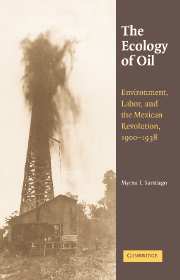Book contents
- Frontmatter
- Dedication
- Contents
- List of Maps, Figures, Tables, and Appendices
- Acknowledgments
- Introduction
- PART ONE THE HUASTECA BEFORE OIL
- PART TWO THE ECOLOGY OF OIL
- PART THREE CHALLENGING THE ECOLOGY OF OIL
- 5 “Coarse in Manner”: Mexican Oil Workers, 1905–1921
- 6 Revolutionaries, Conservation, and Wasteland
- 7 Revolution from Below: The Oil Unions, 1924–1938
- Conclusion
- Epilogue
- Appendices
- A Note on the Sources
- Archives Consulted
- Selected Bibliography
- Index
6 - Revolutionaries, Conservation, and Wasteland
from PART THREE - CHALLENGING THE ECOLOGY OF OIL
Published online by Cambridge University Press: 05 March 2015
- Frontmatter
- Dedication
- Contents
- List of Maps, Figures, Tables, and Appendices
- Acknowledgments
- Introduction
- PART ONE THE HUASTECA BEFORE OIL
- PART TWO THE ECOLOGY OF OIL
- PART THREE CHALLENGING THE ECOLOGY OF OIL
- 5 “Coarse in Manner”: Mexican Oil Workers, 1905–1921
- 6 Revolutionaries, Conservation, and Wasteland
- 7 Revolution from Below: The Oil Unions, 1924–1938
- Conclusion
- Epilogue
- Appendices
- A Note on the Sources
- Archives Consulted
- Selected Bibliography
- Index
Summary
¿Qué acontecerá, digo yo, con esos campos en que las emulsiones de chapopote y agua han dejado inútiles millares de hectáreas? Acaso es el propietario el queúnica y exclusivamente resiente los perjuicios? No, es el Estado también pues aún suponiendo que esos charcos fuesen quemados, las tierras habrán perdido por dicha causa el resultado de su beneficio agrícola,único índice de riqueza estable en el país.
M. Méndez, February 1, 1937Oil exploitation is not always a benefit, for it has imperiled the progress of some Mexican regions, among them Las Huastecas,… says Ing. José D. Baez, chief of the petroleum department. He sees “desolation, ruin and degeneration” among the inhabitants of this region as a result of petroleum exploitation… “Fantastic wealth extracted from the subsoil not only evaporates without hardly a trace, but is destructive, for it has ruined numerous communities of people who loved work and the land.”
Enclosure to dispatch number 3862 of August 24, 1936, from the American Embassy, Mexico CityIf the rude men directly affected by the changes and processes of the ecology of oil responded by fashioning and nurturing a confrontational culture and politics, they were not alone. The national revolutionary leadership also expressed its discontent with the oil apparatus the moment the bullets started flying across the Huasteca. As soon as they could, the revolutionaries began building institutions and emitting decrees aimed at regulating the industry. An explicit ethic of conservation drove their efforts, but the weakness of the revolutionary state-in-formation and the strength of the oil companies thwarted them. Patently defeated by the mid-1920s, the revolutionaries nonetheless changed the terms of the debate. After 1921, foreign oil ceased to be associated with progress. A narrative of wasteland emerged in Mexican national discourse instead. It would remain dominant through the 1938 nationalization and into the present. Likewise, new agrarian policies born out of Article 27 of the 1917 Constitution allowed the indigenes of the Huasteca to reemerge as actors to claim ownership of a radically changed landscape. The results of their efforts were more mixed, as the impetus for land reform ebbed and flowed with successive administrations. The Mexican government nevertheless continued trying to erode the power of the oil companies and reconfigure their practices into the late 1930s. Again, the efforts failed.
- Type
- Chapter
- Information
- The Ecology of OilEnvironment, Labor, and the Mexican Revolution, 1900–1938, pp. 256 - 290Publisher: Cambridge University PressPrint publication year: 2006



